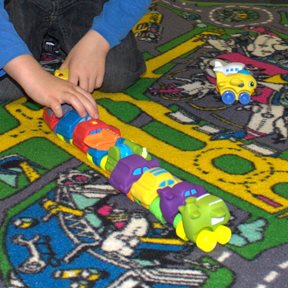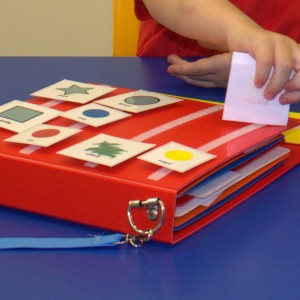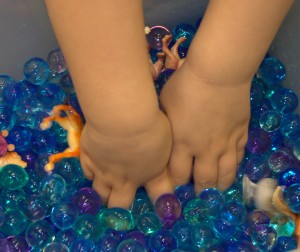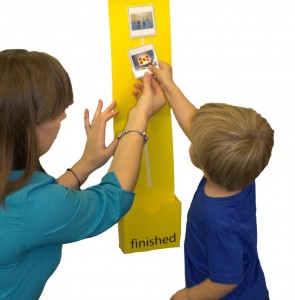 Are you wondering about autism but not sure what it really means? Are you concerned about a child you know and want to find out more? Here is an overview of the characteristics of autism and some answers to common questions.
Are you wondering about autism but not sure what it really means? Are you concerned about a child you know and want to find out more? Here is an overview of the characteristics of autism and some answers to common questions.
Autism is considered a “pervasive developmental disorder”.
- “Pervasive” meaning it effects all areas of a person’s life.
- “Developmental” meaning it begins in early childhood.
- “Spectrum” meaning it can include a wide range of characteristics, abilities and challenges.
Adults and children with autism do vary widely in their learning ability, behaviour and other characteristics yet all share some common challenges. All people on the “autism spectrum” have difficulties with social interaction, communication and restricted or repetitive interests or activities. Though there are many challenges, children and adults with ASD can make positive steps towards managing or overcoming these challenges with the right support and understanding. Don't forget people with ASD have many positive characteristics too!
Difficulties with social impairment can vary from being withdrawn and avoiding social contact through to people who try to interact with others but appear odd or inappropriate at times.
These challenges can include:
- difficulty understanding the thoughts and feelings of others
- limited ability to show sympathy or empathy.
- difficulty understanding how to behave in social situations
- difficulty understanding the unwritten rules of social interaction
- difficulty with social play
- difficulty using eye contact and facial expressions in a social way
- difficulty understanding the facial expressions and body language of others of others.
- difficulty joining in with others and sharing toys and games
- a preference for playing alone.
- liking to do things their own way and difficulty taking into account the needs and interests of others.
 Difficulties with communication can vary from people who have no speech or very limited communication through to people who can speak very well but may have difficulty with the social aspects of communicating.
Difficulties with communication can vary from people who have no speech or very limited communication through to people who can speak very well but may have difficulty with the social aspects of communicating.
These challenges may include:
- difficulty taking turns in a conversation
- a tendency to dominate the interaction or get stuck on a favourite topic.
- being very literal and not understanding more abstract meanings.
- asking excessive questions
- repeating things heard somewhere else such as on TV or in a movie.
- not understanding that certain things are not appropriate to talk about in certain places or with certain people
- appearing blunt or inappropriate
They will also have difficulty with the nonverbal aspects of communicating such as:
- understanding and using eye contact, facial expressions and tone of voice.
- possibly using a flat or unusual tone
- possibly sounding as though they have an accent though they do not come from another language background.
Restricted and repetitive interests and activities can vary widely depending on the person. What people with autism have in common is the strong focus they have on one, or a limited range of activities which may include:
- strong interest in a certain topic such as dinosaurs, transport, numbers, timetables or ancient Egypt,
- fascination with a certain movie, TV show or character,
- repeating a simple activity such as watching a favourite object spin, or lining certain things up over and over.
What people with autism have in common is the intense level of their interest and the long periods of time they can spend doing their activity. Often this means that they have little interest in other activities not related to their topic of choice and spend most of their free time doing, talking about or thinking about their interest.
Many people with autism also show a preference for sameness such as:
- liking to follow the same routine
- not liking change
- becoming unsettled or even distressed with new activities, places or people
- eating a limited range of foods or preferring to wear the same clothes
- liking to always use the same items for a certain task, such as certain plates or cutlery
- doing things in the same place or in the same order
- finding it hard to move to new activities or try new things even if they are enjoyable
 Some people with autism show unusual or repetitive movements such as:
Some people with autism show unusual or repetitive movements such as:
- flapping, rocking, toe walking,
- hand or finger movements,
- repetitive movements with objects such as spinning, lining up, sorting, flicking,
- repeatedly turning things on and off or opening and shutting things.
Many people with autism also show sensory issues such as sensitivity to noises, smells, textures, certain clothes or foods.
All people with autism share these three areas of difficulty, but have their own personality, and vary according to their intelligence level, family and cultural background. Some may have other diagnosis such as ADHD, intellectual disability or learning problems while others do not. As Sue Larkey states on her website “to know a person with autism is not to know autism”. Each person with autism requires support and understanding tailored to their own unique needs.
Common questions
If I think my child has autism what do I do? The process for getting a diagnosis and follow up support varies depending on where you live. Our website has details about the process in South Australia. In other areas discuss your concerns with your doctor and ask to be referred to a paediatrician that specialises in autism.
What are the signs of ASD in very young children? support at an early age can be very helpful in helping children with autism develop the skills they need, so early diagnosis is very helpful. Some things that suggest a child should have further assessment include:
- not pointing or showing things to others
- limited eye contact
- not responding to their name
- not smiling at familiar people
- not being interested in other children
- unusual play such as spining, lining up or carrying one thing around all the time
- not pretending with toys
- copying from TV rather than people
- not bringing things to play with others
- intense focus on one thing such as lining up cars, flicking light switches or opening and shutting things
- unusual movements such as hand flapping or toe walking
- upset by certain sensations such as certain noises or touching certain textures
- seeking certain sensations such as rubbing things on their face, smelling or licking things, or looking closely at lights
- being upset by minor changes to daily routines
Will my child grow out of it? Autism is a lifelong condition so people do not grow out of it. They do however learn and develop, their needs and abilities change over time and with support many people with autism lead full and happy lives. Support in adulthood may vary from being fully dependant to needing just a little support with relationships. The more support children receive when they are younger the better they will do when they are older.
 What kind of support does my child need? Support needs vary from child to child so each child should be individually assessed to determine what is most important for them. Many children benefit from speech pathology for communication skills, occupational therapy for fine motor and sensory issues and support for daily activities and/or behaviour. Children also often need help to develop social skills.
What kind of support does my child need? Support needs vary from child to child so each child should be individually assessed to determine what is most important for them. Many children benefit from speech pathology for communication skills, occupational therapy for fine motor and sensory issues and support for daily activities and/or behaviour. Children also often need help to develop social skills.
What causes autism? Autism is thought to be at least partly genetic as it tends to run in families. Scientists are not yet clear about the exact genes or causes as yet but it is clear that it is not caused by the way children are raised.
What about Asperger's syndrome? Asperger's syndrome is a term used to describe people on the autism spectrum who have average or above intelligence and good verbal skills. Since the new DSM V criteria began to be used in 2013 newly diagnosed adults and children would now be considered part of the "autism spectrum" and would receive a diagnosis of ASD. The literature available on Asperger's syndrome can be useful in understanding adults and children who are at the higher functioning end of the autism spectrum.
Talking Matters provides diagnosis, speech therapy and occupational therapy for children on the autism spectrum in Adelaide, South Australia. We also have an autism consultant to help with behaviour, sleeping, toileting and support for parents. We offer a range of group programs for social and play skills. browse our website to find out more.
More information about autism is available to download from the download section of Our website. Check our Pinterest page for activities, information and ideas. Check the Talking Matters website for other useful resources. Like us on Facebook and follow us on Twitter so you don't miss out on what's happening.
Jo Brenecki
Related Blog Posts
If you liked this post you may also like:
10 ways to boost your superpowers!
What is PDD-NOS?
ASD: Think and feel
What is dyslexia?



